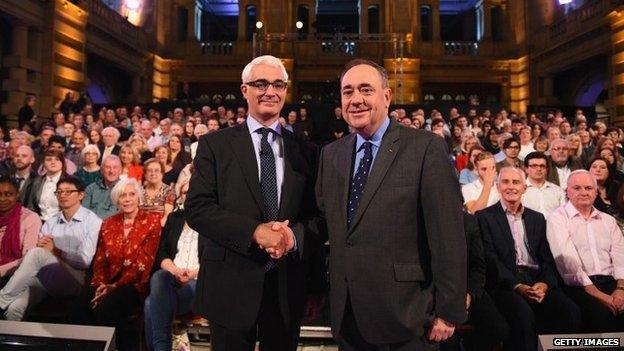Fighting will continue after debate
- Published

Two heavyweight bruisers locked together - both desperate to land a knock-out blow.
That, I fear, may be what sticks in the memory after Monday night's debate between Alex Salmond and Alistair Darling.
The two men's aggression was a sign of how important the choice now facing the voters of Scotland is and of how tense both sides are on the eve of the first votes being cast.
One sixth of Scots will be able to vote by post in the next day or two.
From the start it was clear that Darling, who won the first debate, was edgy and nervy whilst Salmond was better prepared and more confident.
Scotland's first minister had come prepared to answer the question that damaged him a few weeks ago - what's your Plan B? - if Westminster refuses to share the pound with a newly independent Scotland.
He declared he had not one but three Plan Bs but what he was seeking was a "mandate" from the people of Scotland - a word he repeated again and again - to negotiate to share the pound.
Salmond had also come with a new line of attack. He argued that the only way to protect the NHS and to stop welfare cuts was to ensure that the people of Scotland always got the government they voted for.
He accused Darling - to the former Labour chancellor's obvious fury - of "being in bed with the Tories". His aim was clear - to increase the risks in voters' minds of a No vote.
Voters always say they hate negative campaigns but the reason they're used again and again all over the world is that they work.
I doubt whether many of the genuinely undecided will have sat through all this evening's exchanges or have learned that much.
The key to the outcome though will be what those voters, many of them traditional Labour supporters in the west of Scotland, fear most - the economic uncertainty of becoming an independent country or the fear of another Tory government in Westminster.
Even if people say how much they dislike the fighting, don't imagine that it will stop until the last vote is cast.
PS. Be wary of reading too much into post-debate polls which will, I'm sure, hand the debate to Salmond. Darling was judged the clear winner first time round but it was the Yes campaign whose vote increased.